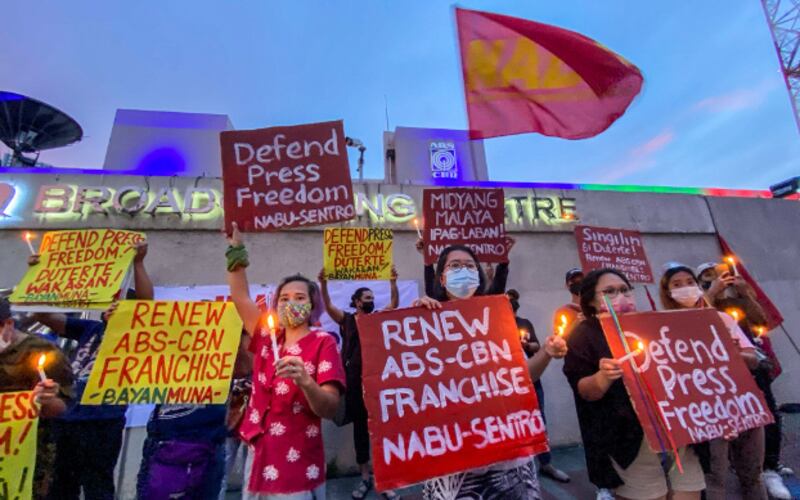Filipino billionaire Manny Villar, an ally of President Rodrigo Duterte, is taking over frequencies of TV channels that were operated by the country’s largest broadcaster before the government shut them down in 2020.
Critics said the move entrenched the influence of politically powerful families in the Philippines, but the government said it was legal.
The country’s telecommunication regulator, the National Telecommunications Commission, has granted Villar’s Advanced Media Broadcasting System (AMBS) provisional authority to operate the digital TV frequency (Channel 16) of ABS-CBN. It also allowed AMBS to temporarily use ABS-CBN’s analog frequency, Channel 2, for “simulcast purposes” until 2023.
“The temporary assignment was granted to ensure service to both analog and digital TV signal users as the country transitions to full digital TV,” the NTC said in a statement late Tuesday.
The NTC said the transfer was approved by the Department of Information Communication and Technology as well as the justice department, noting AMBS was the first applicant for a permit to install, operate and maintain a digital TV channel in Metro Manila.
AMBS lodged its application on Oct. 5, 2006, when the company was not owned by Villar – his Planet Cable firm took control in 2021.
A former senator, Villar ran a losing campaign for president in 2010. His wife, Cynthia, is a sitting senator and his daughter, Camille, is a member of the House of Representatives who was among 70 who voted to shut down ABS-CBN. His son Mark was a member of Duterte’s cabinet before resigning to run for Senate in the May 9 General Election.

‘Crony payback’
An opposition lawmaker and journalists on Wednesday criticized the move, calling it a form of transactional politics while noting Villar donated to Duterte’s 2016 presidential campaign.
“Just like what his idol, the dictator Marcos did during his time, this last two-minute crony payback further exposes the lie of the Duterte administration that it is against oligarchy. The truth is, President Duterte has his own favored oligarchs,” House Deputy Minority Leader Carlos Zarate said in a statement Wednesday.
“While this move clearly benefits the Dutertes and the Villars, as well as their allies like the Marcoses, this is detrimental to the Filipino people. We must be very wary and vigilant in guarding against more midnight schemes and deals of the Duterte administration,” he said.
On Wednesday, the National Union of Journalists of the Philippines (NUJP) said the government did not go through the “traditional public selection process” in re-assigning the channels, adding regulatory powers could have been used to favor Duterte’s allies.
“We are concerned at the concentration of power in a corporate media landscape already dominated by conglomerates and political clans,” the NUJP said in a statement. “This has dire implications on the people’s right to relevant information, especially during times of crises.”
Cabinet Secretary Karlo Nograles, the acting presidential spokesman, defended Malacañang palace and the Department of Justice (DOJ). Nograles said Villar’s company received no special treatment.
“We’d like to tell the public that when NTC went to the DOJ, it was purely asking a legal question. There was no mention of any names … any private company or any private entity,” Nograles said in a television interview.
“When the DOJ gave its legal opinion, it was just purely answering a legal question,” he said.
ABS-CBN had been one of the most dogged media entities in following Duterte’s rise as well as his war against illegal drugs after he took office in 2016. Police have killed about 8,000 suspected drug addicts and dealers, according to government figures – a number rights activists and survivors said could be as high as 30,000.
In 2020, Duterte allies and others in the House voted against renewing its license, a move protested by rights and media groups.
Following the closure of its free-to-air channels that led to layoffs of hundreds of workers, ABS-CBN was forced to migrate its operations online and over cable.
Dennis Jay Santos in Davao, Philippines, contributed to this report.
